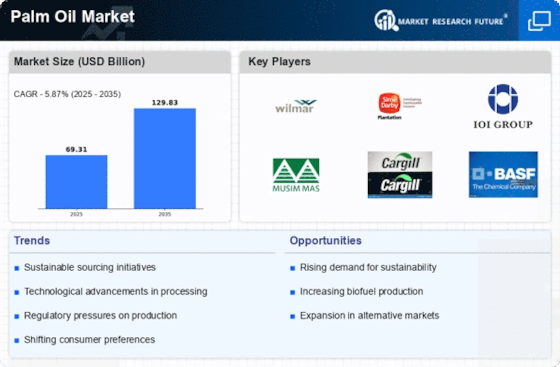Top Industry Leaders in the Palm Oil Market

The global palm oil market is a vital sector in the agricultural and food industries, serving as a versatile ingredient with various applications. Key players in this market are strategically positioning themselves to meet the increasing demand for palm oil while addressing concerns related to sustainability and environmental impact. This analysis provides a comprehensive overview of the competitive landscape, covering key players, strategies, market share factors, emerging companies, industry news, current investment trends, and a notable development in 2023.
Key Players:
Cargill Inc. (U.S)
Wilmar International Limited (Singapore)
Sime Darby (Malaysia)
IOI Corp. (Malaysia)
Golden Agri Resources Limited (Singapore)
Kulim BHD (Malaysia)
Godrej Agrovet Limited (India)
London Sumatra (Indonesia)
Strategies Adopted:
The palm oil market employ diverse strategies to navigate the complex landscape. Strategies encompass sustainable sourcing, engagement in the entire supply chain, diversification into related industries, and commitment to certification standards like RSPO (Roundtable on Sustainable Palm Oil). For instance, Wilmar International Limited has focused on sustainability initiatives, including its "No Deforestation, No Peat, No Exploitation" policy, to address environmental and social concerns associated with palm oil production. The company's strategy emphasizes transparency and traceability, aiming to balance palm oil demand with responsible practices.
Market Share Analysis:
The palm oil market involves evaluating multiple factors that impact competitive positioning. Key considerations include sustainability practices, certifications, price competitiveness, processing efficiency, and adherence to regulatory standards. Companies that effectively balance these factors are better positioned to capture and retain a significant share of the market. Additionally, factors such as consumer awareness, commitments to zero-deforestation, and efforts to combat social issues contribute to market differentiation and influence buyer choices.
News & Emerging Companies:
The palm oil market has seen emerging companies and initiatives that aim to address sustainability challenges. In recent years, there has been a growing interest in sustainable palm oil production, with organizations like GreenPalm and the Palm Oil Innovation Group (POIG) working towards promoting responsible practices. These entities contribute to the industry by fostering awareness, encouraging sustainable cultivation, and supporting smallholder farmers in adopting more sustainable palm oil practices.
Industry Trends:
The palm oil market revolve around sustainability, technological advancements, and addressing social issues. Key players are investing in technologies for sustainable palm oil cultivation, exploring alternative uses for palm oil by-products, and engaging in initiatives to improve labor practices. Additionally, investments in research and development to enhance yield efficiency and reduce the environmental impact of palm oil production contribute to sustainable growth in the market.
Current investment trends also highlight the importance of supporting smallholder farmers and addressing social challenges associated with palm oil production. Companies are increasingly investing in programs that empower smallholders, improve livelihoods, and foster community development. Furthermore, investments in transparency and reporting mechanisms contribute to building trust with consumers and stakeholders, demonstrating a commitment to responsible business practices.
Competitive Scenario:
The palm oil market is marked by a complex interplay of economic, environmental, and social factors. The "Big Five" companies, along with other major players, are striving to balance the global demand for palm oil with sustainability goals. The market is also influenced by consumer awareness, regulatory pressures, and initiatives that aim to redefine the industry's practices. Addressing deforestation concerns, improving supply chain transparency, and fostering sustainable practices are critical components of the overall competitive scenario.
Recent Development
The palm oil market was the announcement by IOI Corporation Berhad regarding its commitment to achieving net-zero carbon emissions by 2025. This initiative marked a significant step towards addressing environmental concerns associated with palm oil production. IOI Corporation Berhad outlined a comprehensive strategy that includes sustainable sourcing, investments in renewable energy, and continuous efforts to reduce its carbon footprint.
The commitment to achieving net-zero carbon emissions underscores the industry's recognition of the need for environmental stewardship. IOI Corporation Berhad's development aligns with broader global efforts to mitigate climate change and demonstrates a proactive approach towards adopting sustainable practices in the palm oil sector. This move not only positions IOI Corporation Berhad as a leader in environmental responsibility but also contributes to shaping the future trajectory of sustainable palm oil production.











